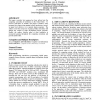270 search results - page 2 / 54 » Using student performance predictions in a computer science ... |
SIGCSE
2003
ACM
14 years 8 days ago
2003
ACM
Computer science has a reputation of being a discipline in a perpetual state of accelerated progress—a discipline in which our techniques, our hardware, our software systems, an...
SIGCSE
2008
ACM
13 years 7 months ago
2008
ACM
This paper describes CyberCivics, a novel approach to computer science outreach that integrates hands-on computing experiences with the study of contemporary social and political ...
SIGCSE
2009
ACM
14 years 7 months ago
2009
ACM
This paper considers how gaming has been infused into the computing curriculum of institutions in the United States. To increase motivation of students and improve retention, many...
SIGCSE
2006
ACM
14 years 1 months ago
2006
ACM
By expanding the teaching styles used in computer science classrooms, we can expand the audience of students that enjoy and excel in technology. Rather than focusing on major curr...
TE
2010
13 years 1 months ago
2010
Abstract--As demand increases for circuits with higher performance, higher complexity, and decreased feature size, asynchronous (clockless) paradigms will become more widely used i...

